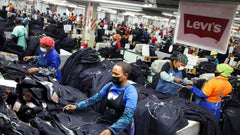
The Amazon Soy Moratorium: A Critical Line of Defense Against Deforestation
Table of Contents
- Key Highlights:
- Introduction
- The Amazon Rainforest: A Global Treasure
- What is the Amazon Soy Moratorium?
- The Impact of the Moratorium
- Challenges Facing the Moratorium
- The Role of Industry Support
- Global Implications of Deforestation
- Future of the Amazon Soy Moratorium
- Conclusion
- FAQ
Key Highlights:
- The Amazon Soy Moratorium, established in 2008, has been effective in preventing deforestation in the Brazilian Amazon, saving over 1.8 million hectares of forest.
- Recent legislative changes in Mato Grosso threaten the moratorium by removing tax incentives for compliance, potentially leading to increased deforestation.
- Continued support from major companies in the soy sector remains crucial for the moratorium's survival, as it faces mounting pressure from agricultural interests.
Introduction
The Amazon Rainforest, often referred to as the "lungs of the world," holds a vital role in the global ecosystem. Spanning across several South American countries, the Amazon is home to approximately 10% of the planet's known species, making its preservation crucial for biodiversity and climate regulation. However, deforestation driven primarily by agricultural expansion, particularly for soy and livestock, poses an ongoing threat to this irreplaceable resource.
Since its inception in 2008, the Amazon Soy Moratorium has served as a pivotal agreement aimed at curbing deforestation linked to soy production in the region. The moratorium has garnered support from various stakeholders and has effectively limited the expansion of soy cultivation into newly deforested areas. Yet, recent political and legislative shifts in Brazil, especially in the state of Mato Grosso, have reignited concerns over the future of this crucial agreement.
This article delves into the implications of the Amazon Soy Moratorium, its successes in protecting the rainforest, current threats it faces, and the broader significance of soy production in the Amazon region.
The Amazon Rainforest: A Global Treasure
The Amazon Rainforest is not just a collection of trees; it is a complex and dynamic ecosystem that plays an essential role in the Earth's climate system. Covering around 5.5 million square kilometers, the Amazon spans across Brazil, Peru, Colombia, Venezuela, Ecuador, Bolivia, Guyana, Suriname, and French Guiana. Its vast biodiversity includes millions of species of plants, animals, and microorganisms, many of which are not found anywhere else on Earth.
The rainforest acts as a significant carbon sink, absorbing vast amounts of carbon dioxide from the atmosphere, which helps mitigate climate change. Additionally, it influences weather patterns both locally and globally, making its health vital for agricultural productivity and water supply.
However, the rapid pace of deforestation, driven by agricultural expansion, poses a significant risk to the Amazon's ecological integrity. The conversion of forested land into agricultural fields, particularly for soy production, has accelerated over the last few decades, leading to alarming rates of forest loss. The need for sustainable practices and effective policies to protect this vital ecosystem has never been more urgent.
What is the Amazon Soy Moratorium?
Established in 2008, the Amazon Soy Moratorium is a voluntary agreement among soy traders, aimed at preventing the purchase of soybeans produced on lands deforested after 2008 in the Brazilian Amazon. This initiative was a response to increasing international pressure regarding deforestation and the environmental impact of soy production.
The moratorium covers approximately 60% of the Brazilian Amazon, which is a substantial area given that Brazil hosts the majority of the Amazon Rainforest. The agreement is not merely a verbal commitment; it is supported by robust monitoring systems, including satellite imagery and aerial assessments, allowing for real-time tracking of deforestation activities.
Since its implementation, the moratorium has been credited with preventing the conversion of over 1.8 million hectares of forest into agricultural land. According to the UK Soy Manifesto, a coalition focused on reducing deforestation linked to the soy sector, around 98% of the soy cultivated in the Amazon biome adheres to the moratorium guidelines. This success has positioned the moratorium as a model for other regions facing similar environmental challenges.
The Impact of the Moratorium
The impact of the Amazon Soy Moratorium extends beyond mere numbers; it has significant ecological and economic implications. By curbing deforestation, the moratorium has helped maintain biodiversity within the Amazon, protecting countless species from habitat loss. The preservation of the forest also supports local communities that rely on its resources for their livelihoods.
From an economic standpoint, the moratorium has encouraged the development of sustainable practices within the soy industry. Farmers and companies that comply with the moratorium gain access to international markets that prioritize sustainable sourcing. This creates a competitive advantage for those who adopt environmentally friendly practices, fostering a culture of sustainability within the agricultural sector.
Moreover, the moratorium has sparked discussions about the importance of corporate responsibility in environmental conservation. It has brought to light the need for industries to align their practices with environmental sustainability, urging stakeholders to recognize the long-term benefits of preserving natural resources.
Challenges Facing the Moratorium
Despite its success, the Amazon Soy Moratorium is now facing significant challenges that threaten its effectiveness. Recent legislative changes in the state of Mato Grosso, one of the largest soy-producing regions in Brazil, have raised alarms. The state government has enacted laws that eliminate tax incentives for companies adhering to the moratorium, effectively increasing operational costs for compliant businesses.
This shift is largely driven by agricultural interests that argue the moratorium goes beyond legal requirements, limiting their ability to utilize land effectively. As a result, there is growing pressure from local farmers and businesses to weaken or repeal the moratorium, which could lead to an increase in deforestation rates.
Additionally, the political landscape in Brazil has shifted, with some government officials expressing skepticism towards environmental regulations. The lifting of a suspension on state legislation that undermines the moratorium has further fueled concerns about its future. As these changes unfold, the potential for a rollback of the moratorium looms larger, raising the stakes for both environmental advocates and the agricultural sector.
The Role of Industry Support
In the face of these challenges, the continued support of major companies within the soy industry is critical for the survival of the Amazon Soy Moratorium. The UK Soy Manifesto, which comprises over 50 businesses representing a significant portion of the UK's demand for soy, has publicly reaffirmed its commitment to the moratorium. This backing underscores the importance of corporate responsibility in environmental stewardship.
Industry support is essential not only for maintaining the moratorium but also for promoting sustainable practices throughout the supply chain. As consumers increasingly demand transparency regarding the environmental impact of their purchases, companies that prioritize sustainability can enhance their market position. This creates a powerful incentive for businesses to adhere to the moratorium and advocate for its continuation.
Furthermore, collaboration between governments, NGOs, and the private sector can foster innovative solutions to balance agricultural production and environmental conservation. By working together, stakeholders can develop strategies that promote sustainable land use, ensuring that the Amazon remains protected for future generations.
Global Implications of Deforestation
The implications of deforestation in the Amazon extend far beyond Brazil's borders. The loss of forest cover contributes to climate change, affecting weather patterns and ecosystems worldwide. The Amazon Rainforest plays a crucial role in regulating the global climate, and its degradation can lead to severe consequences, including increased carbon emissions and altered precipitation patterns.
Additionally, deforestation has social implications, particularly for Indigenous communities that depend on the rainforest for their cultural and economic survival. The destruction of their ancestral lands threatens their way of life and exacerbates social inequalities. Protecting the Amazon is not just an environmental issue; it is also a matter of social justice.
Global demand for soy continues to rise, driven by its use in animal feed and biofuels. As countries seek to increase agricultural production, the pressure on the Amazon grows. This highlights the need for international cooperation and commitment to sustainable sourcing practices. Initiatives like the Amazon Soy Moratorium serve as critical touchpoints for global efforts to combat deforestation and promote responsible consumption.
Future of the Amazon Soy Moratorium
The future of the Amazon Soy Moratorium hinges on several factors, including political will, industry support, and public awareness. As stakeholders navigate the complexities of agricultural production and environmental conservation, a collective commitment to sustainability will be paramount.
Advocacy efforts must continue to emphasize the importance of the moratorium in protecting the Amazon. Public campaigns that raise awareness about the consequences of deforestation can galvanize consumer support for sustainable soy products.
Moreover, policymakers must recognize the value of the moratorium in preserving biodiversity and mitigating climate change. Legislative frameworks that reinforce the moratorium can provide the necessary stability for compliant businesses, ensuring that the Amazon remains a vital resource for future generations.
Conclusion
The Amazon Soy Moratorium stands as a critical mechanism for safeguarding the Amazon Rainforest against the threat of deforestation. Its successes in preventing forest loss demonstrate the potential for voluntary agreements to drive positive change within industries. However, ongoing challenges necessitate vigilance and collaboration among stakeholders to ensure its survival.
As the world grapples with the impacts of climate change and environmental degradation, the fate of the Amazon is intertwined with global efforts to promote sustainability. The decisions made today will shape the future of this irreplaceable ecosystem and the countless lives it supports.
FAQ
What is the Amazon Soy Moratorium? The Amazon Soy Moratorium is a voluntary agreement among soy traders to refrain from purchasing soybeans produced on lands deforested after 2008 in the Brazilian Amazon.
Why is the moratorium important? The moratorium has significantly reduced deforestation rates in the Amazon, helping to preserve biodiversity and maintain the ecological balance of the region.
What challenges does the moratorium face? Recent legislative changes in Brazil, particularly in Mato Grosso, threaten the moratorium by removing tax incentives for compliance, leading to increased pressure from agricultural interests.
How can individuals support the moratorium? Consumers can support the moratorium by choosing sustainably sourced soy products and advocating for policies that protect the Amazon Rainforest.
What are the global implications of Amazon deforestation? Deforestation in the Amazon contributes to climate change, affects global weather patterns, and threatens the livelihoods of Indigenous communities dependent on the rainforest.
قوة التجارة الإلكترونية الخاصة بك مع رؤانا وتحديثاتنا الأسبوعية!
ابقَ متوافِقًا مع ما يحدث في عالم التجارة
عنوان البريد الإلكتروني
مختارة خصيصًا لك

11 July 2025 / Blog
Retail Giants Stand Firm: Insights from the NRF’s 2025 Top 100 Retailers List
اقرأ المزيد
11 July 2025 / Blog
Levi Strauss Navigates Tariff Challenges While Boosting Financial Outlook
اقرأ المزيد
11 July 2025 / Blog


